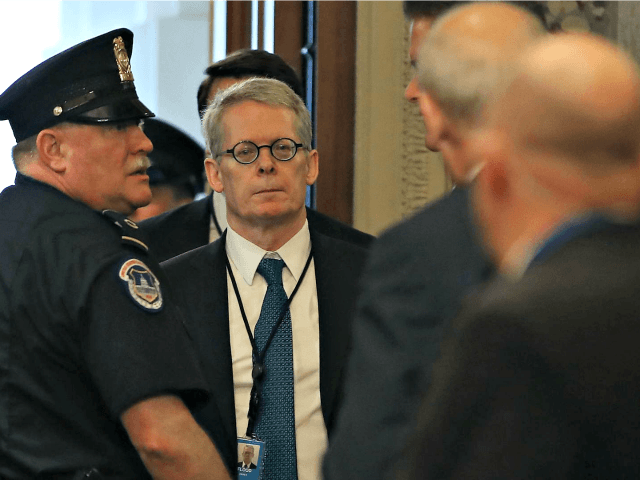WASHINGTON, DC – White House Special Counsel Emmet Flood sent a letter to Attorney General William Barr making clear that President Donald Trump is retaining his legal privileges as partisan Democrats escalate their conflict against the president over the Mueller Report.
Flood sent the five-page letter on behalf of the president on April 19, but most media outlets have covered the letter only in the past few days. It shows a White House fully aware that Democrats are waging an all-out war against the Trump presidency. The White House is transitioning from cooperating with Special Counsel Robert Mueller’s investigation to a war footing facing off against congressional Democrats, some of whom are citing the Mueller Report as a roadmap for impeaching the president.
The letter points out that under the Constitution’s separation of powers, Mueller was part of the Justice Department, and therefore part of the executive branch that answers to President Trump. The Mueller investigation was thus an internal review by the administration as far as constitutional principles are involved. By contrast, Congress is a separate branch of government. Because the executive branch is independent of Congress and thus does not answer to the legislative branch, the White House will deal with a congressional investigation in a manner different from Mueller’s investigation.
“The [Special Counsel Office] Report suffers from an extraordinary legal defect: It quite deliberately fails to comply with the requirements of governing law,” Flood tells Barr, going on to say the White House wants to make several points crystal-clear.
Quoting parts of the Mueller Report, the letter goes on to explain:
What prosecutors are supposed to do is complete an investigation and then either ask the grand jury to return an indictment or decline to charge the case. When prosecutors decline to charge, they make that decision not because they have “conclusively determin[ed] that no criminal conduct occurred,” but rather because they do not believe that the investigated conduct constitutes a crime for which all the elements can be proven to the satisfaction of a jury beyond a reasonable doubt. Prosecutors simply are not in the business of “exonerating” investigated persons. In the American justice system, innocence is presumed; there is never any need for prosecutors to conclusively determine it. Nor is there any place for such a determination. Our country would be a very different (and very dangerous) place if prosecutors applied the [Special Counsel Office] standard and citizens were obliged to prove “conclusively … that no criminal conduct occurred.”
“Because they do not belong to our criminal justice vocabulary, the [Special Counsel Office’s] inverted-proof standard and ‘exoneration’ statements can be understood only a political statements,” Flood continues.
The letter recounts various types of information that President Trump could have withheld by asserting executive privilege, but pointed out that, in the interest of maximizing transparency to serve the public interest, the president did not assert this protection.
Flood goes on to explain that President Trump wants to ensure that Barr understands three things. First, that the president’s declining to assert executive privilege regarding the report does not mean that he has waived executive privilege going forward. Second, that although President Trump did not claim executive privilege over the Mueller Report, he reserves the right to claim privilege over underlying materials like FBI investigation notes. And third, that although the president allowed his advisers to cooperate with Mueller by providing testimony, he may not allow those same advisers to testify before Congress, because the Constitution makes the executive branch separate from the legislative branch, and he does not want to create a precedent that U.S. presidents are subject to congressional oversight.
“Government officials, with access to classified information … engaged in a campaign of illegal leaks against the President,” the letter continues. “Many of those leaks were felonies.”
The White House letter puts all this in the context of the “big picture” of American civic life:
Not so long ago, the idea that a law enforcement official might provide the press with confidential governmental information for the proclaimed purpose of prompting a criminal investigation of an identified individual would have troubled Americans of all political persuasions. That the head of our country’s top law enforcement agency has actually done so to the President of the United States should frighten every friend of individual liberty. Under our system of government, unelected Executive Branch officers and intelligence personnel are supposed to answer to the person elected by the people – the President – and not the other way around. This is not a Democratic or a Republican issue; it is a matter of having a government responsible to the people – and, again, not the other way around. In the partisan commotion surrounding the released Report, it would be well to remember that what can be done to a President can be done to any of us.
Flood concludes by noting that this two-year saga has hampered the president’s efforts to carry out the agenda he was elected to enact and placed a cloud over the presidency which is only now starting to lift. He concludes by saying that all supporters of limited government should be concerned about these things, and asks the letter to be made part of the Justice Department records on this matter.
Ken Klukowski is senior legal analyst for Breitbart News. Follow him on Twitter @kenklukowski.

COMMENTS
Please let us know if you're having issues with commenting.